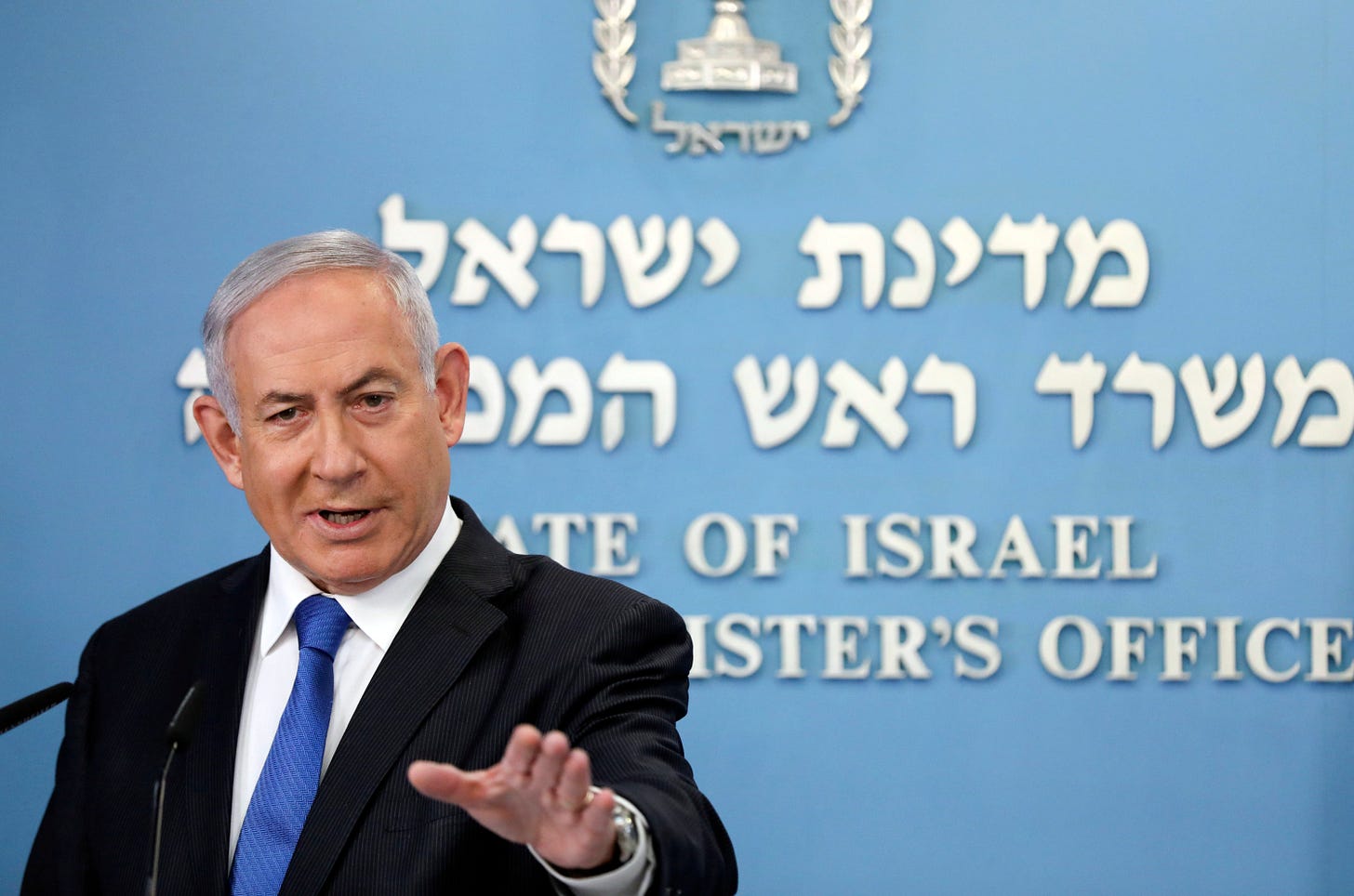Trump Tries to Grab Credit for Israel-UAE Deal
The president wishes he could slap his own name on the deal, but Prime Minister Netanyahu did the legwork.

A breakthrough diplomatic agreement between Israel and the United Arab Emirates (UAE) was announced yesterday morning in dramatic fashion on Donald Trump’s Twitter account via a joint statement issued by the two countries and the United States. This marks Israel’s third peace treaty with an Arab nation, after similar agreements with Egypt in 1979 and Jordan in 1994.
The announcement comes at an opportune moment for the president, creating a media frenzy to distract from Joe Biden’s running mate Kamala Harris and wresting control of at least one news cycle from the Democrats in the days before their virtual convention. In conversation with reporters, Trump said of the Israel-UAE accord: “I wanted it to be called the ‘Donald J. Trump Accord,’ but I didn’t think the press would understand that.”
His narcissism is silly—and par for the course. But his silliness also conceals a more important truth: This historic act of conciliation is not about Donald Trump. It is the result of strategic, behind-the-scenes diplomacy on the part of Israel and the UAE, combined with fortuitous geopolitical shifts. That the American president has packaged this historic agreement as a personal pat on the back is a woeful mistake.
Let us briefly examine some of the long-term efforts leading to this accord. First, Israeli prime minister Benjamin Netanyahu has in the last decade pioneered a new diplomatic revolution for the hitherto relatively isolated Jewish state. He has made overtures to Arab, African, and European states, securing trade deals, the recognition of Jerusalem as Israel’s capital, and bilateral security agreements. In 2016, Netanyahu made historic visits to Kenya, Ethiopia, Rwanda, and Uganda. In 2017, Indian Prime Minister Narendra Modi made the first-ever visit of an Indian premier to Israel, resulting in memorable images of the two leaders frolicking together in the Mediterranean. Two years later, Netanyahu made a whirlwind visit to the Gulf country of Oman to meet with its sultan.
Israel’s leadership in civilian and military technology makes it an attractive partner in a volatile part of the world. In addition, Israel’s peaceful ambitions make it a more attractive ally than some other regional powerhouses, such as Russia and Turkey. In short, Israel has been able to convince developing countries to engage in partnerships for mutual economic prosperity and regional security. Though some states, such as the so-called Visegrád countries—Hungary, Poland, Slovakia, and the Czech Republic—hope that relations with Israel might lead to greater cooperation with America, the Israeli “diplomatic revolution” itself occurred through efforts entirely independent of the United States.
Second, Sunni Arab states in the Middle East have a particular reason for making peace with Israel. The rising threat of Iranian hegemony in the region has pushed countries like the UAE further toward Israel. While Trump has made much of his decision to withdraw from the Obama-brokered Iranian nuclear deal, Iran continues to sponsor proxy conflicts in the region, fire at foreign ships near the Straits of Hormuz, expand its nuclear program, and test new missiles. The U.S. disinterest in engaging in military conflict has left a security vacuum in the region, and Israel is working hard to fill it. Israel has the military capability to deter and destroy Iran’s nuclear ambitions. For example, it is widely believed that Israel is behind the recent wave of explosions at strategic Iranian military sites.
Along with military and strategic efforts, Israel has prioritized cultural outreach. Israel’s foreign ministry has developed popular social media pages in Arabic with original content to engage with Arab citizens and thaw personal animosities. And there is even more going on behind the scenes. Secret backchannels between Israel and the Gulf states have been open for some time. Indeed, the Israeli prime minister’s office today personally thanked the director of Mossad, Israel’s renown national intelligence agency, for its role in “developing the ties with the Gulf states over the years,” helping to secure the Israel-UAE accord.
While Netanyahu has many, many flaws—he is currently under numerous criminal proceedings in Israel—he is nonetheless a skilled diplomat, negotiator, and spokesperson for his country. He, perhaps more than anyone else, deserves the credit for this historic agreement. Why, then, did Netanyahu allowed the American president to make the announcement and claim credit for himself and his son-in-law, Jared Kushner? Simple: Netanyahu knows that Israel needs America’s support. The easiest and surest way to stay on Trump’s good side is to flatter and pander to him, so that’s what he’s been doing, sometimes rather ridiculously, for three and a half years. Success, as the saying goes, has many fathers; why not let Trump claim paternity?
The irony is that the historic agreement between Israel and the UAE marks the growing irrelevance of America in the Middle East. As the United States continues to write itself out of the region by abandoning Syria, the Kurds, and even the safety of its own soldiers, this accord will go down in history not as the “Donald J. Trump Accord,” but as an Israeli and Emirati breakthrough.

